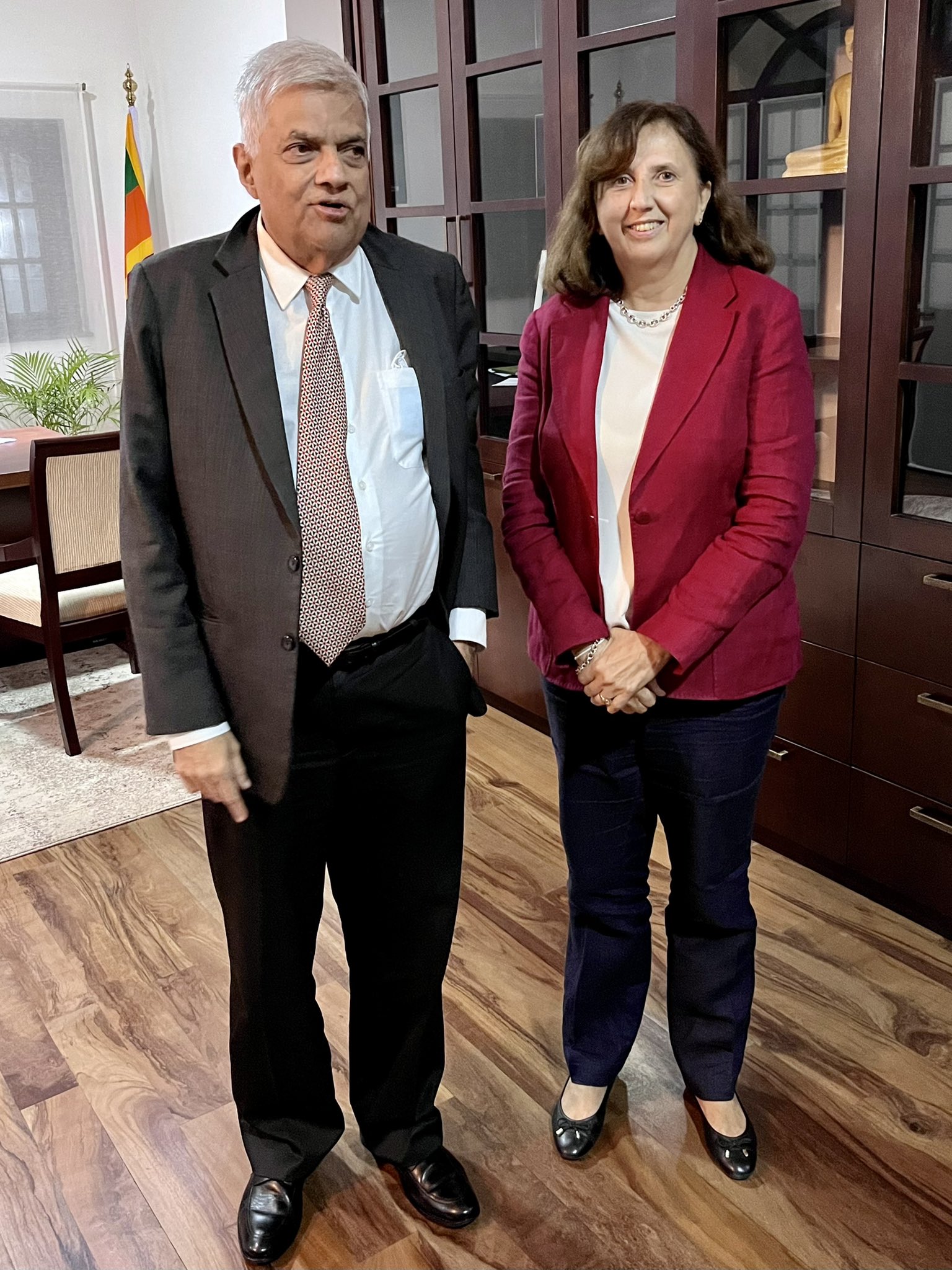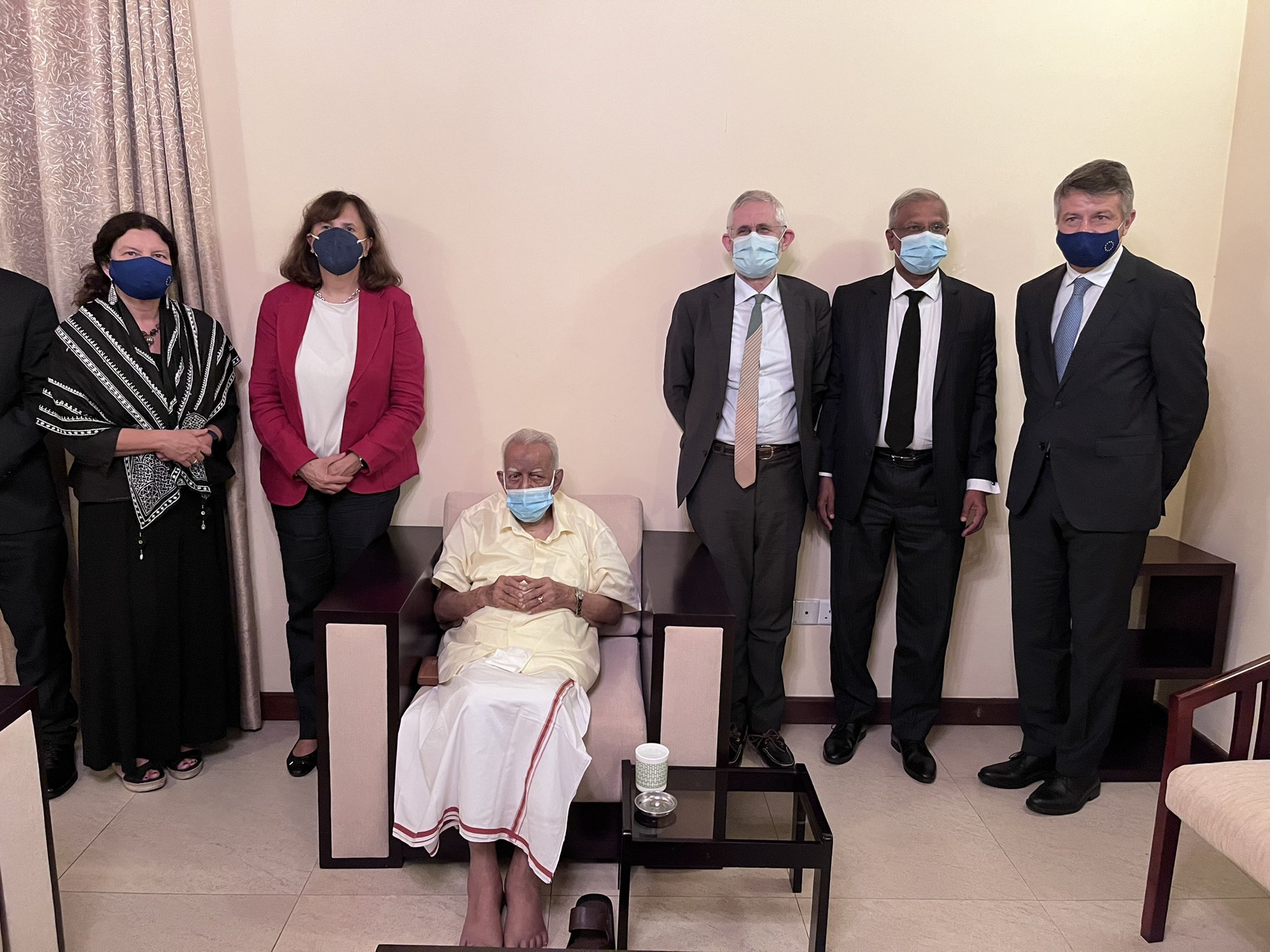In a wide-ranging interview with Sri Lanka’s Financial Times, Deputy Managing Director of the European External Action Service’s (EEAS) Asia and Pacific division, Paola Pampaloni reaffirmed the European Union’s commitment to supporting Sri Lanka during this “difficult period” but stressed the need to see progress on accountability and the protection of democratic freedoms.
The interviews come as news breaks that Sri Lanka’s Presidential Envoy to Europe and Commonwealth, Niranjan de Silva Deva Aditya (Nirj Deva), is reportedly seeking for Sri Lanka to join the Organisation of African, Caribbean and Pacific States (OACPS), expand concessions for Sri Lanka under the GSP+ agreement with the EU, and to strike a free trade agreement.
“I have also started talking to the European Parliament (EU) about an expanded GSP+ that would include the five extra requirements that the EU wants” the Daily Mirror LK reports Deva as stating.
As part of these concessions, the Daily Mirror claims that the EU may stipulate requirements such as participation with the International Criminal Court; ensuring protections for those with disabilities; abolition of the death penalty; and, decriminalising same-sex relationships.

Pampaloni’s interview follows several meetings with high-profile Sri Lanka figures including Sri Lanka’s president, foreign minister, the leadership of the Tamil National Alliance (TNA), and members of civil society.

A serious concern
@PAMPALONIPAOLA and @Rauff_Hakeem exchanged views on minorities rights in , the use of PTA, the economic crisis and constitutional reform. pic.twitter.com/zn8SeLJwN5
— EU in Sri Lanka (@EU_in_Sri_Lanka) October 27, 2022
In her interview with the Financial Times, Pampaloni was asked whether Sri Lanka was at risk of losing its GSP+ concessions. The European diplomat refused to give a direct answer on this instead stressing the need for the state to “safeguard human rights and the rule of law while fostering good and inclusive governance and promoting reconciliation efforts”.
“We are trying to provide our political and economic support to help Sri Lanka return to stability, economic recovery and make advancements on the reconciliation agenda while fully respecting democratic values. Accordingly, we will finalise our GSP+ report this year” she adds.
The statement follows the passage of UNHRC resolution 51/L1 which will “extend and reinforce the capacity of the Office of the High Commissioner to collect, consolidate, analyse and preserve” evidence that may be used in future war crimes trials”.
During the UNHRC session, the EU delegation slammed Sri Lanka’s violent crackdown on protesters stating:
“The EU condemns the unwarranted use of force against peaceful demonstrators and calls upon Sri Lanka to suspend the Prevention of Terrorism Act until it is in full compliance with international human rights law and standards and calls for accountability and immediate acts to end impunity”.
This was reinforced during Pampaloni’s interview with the Financial Times where she stated:
“It has been over three years since the Easter Sunday attacks during which the Government began to use the [Prevention of Terrorism Act] PTA to combat terrorism. The EU is concerned about the extensive use of the PTA since the attack”.
Sri Lanka’s PTA was initially passed as a temporary measure in 1978 and granted Sri Lanka’s sweeping authority to arbitrarily detain individuals. This bill has since been used disproportionately against Tamils and has been linked to police brutality, torture, and enforced disappearances. This history was not noted by the Pampaloni. Instead the focus remained on recent protesters with her stating:
“Any Sri Lankan who wishes to express their opinions should be allowed to do so in a peaceful manner. It is extremely important that the PTA is not used against protestors as it does not possess the necessary safeguards a counter-terrorism legislation should provide”.
Whilst she has called again for Sri Lanka to impose an immediate moratorium on the PTA; the Sri Lankan government is seeking to introduce a rehabilitation bill which Human Rights Watch warns will lead to similar arbitrary detentions.
Calls for domestic institutions
@PAMPALONIPAOLA and Justice Rohini Marasinghe @HRCSriLanka compared experiences in defending human rights. EU welcome HRC initiatives, offered support and suggested institutional reinforcement pic.twitter.com/O41a9CrGei
— EU in Sri Lanka (@EU_in_Sri_Lanka) October 27, 2022
The EU managing director further called for the Sri Lankan government to “initiates an effective accountability process starting with a genuine investigation” and to “strengthen and ensure the independence of the Office of Missing Persons (OMP)”.
The repeated calls to reinforce domestic mechanisms and restore their independence is despite increasing calls from survivor communities and human rights organisations for international action. Speaking to the Tamil Guardian, the Families of the Disappeared have stressed their lack of faith in the ability of the OMP to deliver justice for them.
Despite the OMP’s introduction in 2016, the UN report finds that the institution “has not been able to trace a single disappeared person or clarify the fate of the disappeared in meaningful ways, and its current orientation is to expedite the closure of files”.
Instead, the families of those who were forcibly disappeared, and their advocates, have faced routine harassment at the hands of Sri Lanka’s security forces.
Read more here:
The Pampaloni added during the interview the EU’s concern also for the independence of Sri Lanka’s human rights commission and the protection of labour rights, freedom of association, and freedom of expression.
Sri Lanka’s economic recovery
Speaking on the support the EU will offer, Pampaloni told the Financial Times that this may be through political support to continue engagement with different creditors but that the Sri Lankan government will have to work out negotiations for the IMF loan.
She further added that in terms of aid, the EU will provide humanitarian assistance as they had during the COVID-19 pandemic and will explore development assistance and grants.
It remains to be seen whether the EU will continue Sri Lanka’s favourable GSP+ status despite its failure to repeal the PTA and repeated human rights violations.
